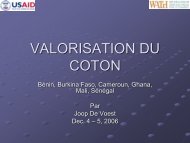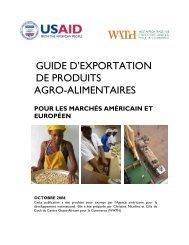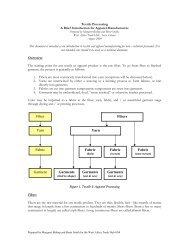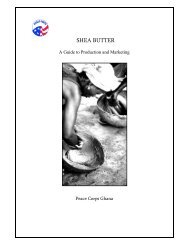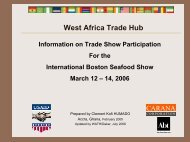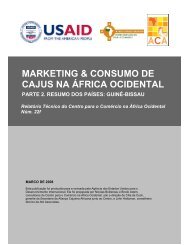A Value Chain Analysis of the Cashew Sector - AGOA Export Toolkit
A Value Chain Analysis of the Cashew Sector - AGOA Export Toolkit
A Value Chain Analysis of the Cashew Sector - AGOA Export Toolkit
Create successful ePaper yourself
Turn your PDF publications into a flip-book with our unique Google optimized e-Paper software.
12 ductivity and insuffi cient nut quality due to sub-optimal agri- 1.2 Objective <strong>of</strong> <strong>the</strong> Study and <strong>the</strong> Methodology Applied<br />
cultural practices; few economies <strong>of</strong> scale in <strong>the</strong> production<br />
and marketing <strong>of</strong> nuts because <strong>of</strong> weak farmer organisations;<br />
limited access to necessary support services (e.g. technology,<br />
credit and marketing); and a lack <strong>of</strong> political support.<br />
Many African governments have realised that agro-processing<br />
industries play a crucial role towards achieving sustainable<br />
economic development. Never<strong>the</strong>less, <strong>the</strong> overwhelming majority<br />
<strong>of</strong> nuts are exported raw, mostly to India, ra<strong>the</strong>r than<br />
processed locally. Th e development <strong>of</strong> a national cashew nuts<br />
processing industry could help diversify Ghana’s economy,<br />
capture an increased part <strong>of</strong> <strong>the</strong> achievable added value, and<br />
create employment opportunities for <strong>the</strong> population.<br />
Th e objective <strong>of</strong> <strong>the</strong> African <strong>Cashew</strong> initiative (ACi), funded<br />
by <strong>the</strong> Bill & Melinda Gates Foundation, <strong>the</strong> German Federal<br />
Ministry for Economic Development and Cooperation and<br />
private sector organisations, is to streng<strong>the</strong>n <strong>the</strong> global competitiveness<br />
<strong>of</strong> cashew production and processing in fi ve pilot<br />
countries in sub-Saharan Africa, namely Mozambique, Ghana,<br />
Burkina Faso, Côte d’Ivoire and Benin.<br />
Th e ACi aims to help 150,000 small-scale cashew producers<br />
increase productivity and gain additional income <strong>of</strong> US$ 15<br />
million per year. Fur<strong>the</strong>rmore, <strong>the</strong> project’s support activities<br />
will develop 5,500 new jobs in local, medium- and large-scale<br />
cashew nut processing industries in <strong>the</strong> pilot countries. Indeed,<br />
<strong>the</strong> vision for <strong>the</strong> longer term is to have 60% <strong>of</strong> cashew nuts<br />
processed locally in <strong>the</strong>ir country <strong>of</strong> growth. Finally, <strong>the</strong> project<br />
should alleviate rural poverty and promote pro-poor growth<br />
by increasing <strong>the</strong> income <strong>of</strong> poor small-scale farmers and by<br />
creating new employment opportunities, especially for women.<br />
Th is cashew project is implemented by <strong>the</strong> Deutsche Gesellschaft<br />
für Technische Zusammenarbeit (GTZ) GmbH in<br />
cooperation with three sub-grantees: Technoserve, a US nongovernmental<br />
organisation; FairMatch Support, a non-pr<strong>of</strong>i t<br />
foundation based in <strong>the</strong> Ne<strong>the</strong>rlands; and <strong>the</strong> African <strong>Cashew</strong><br />
Alliance, a supranational platform <strong>of</strong> private and public sector<br />
partners involved in <strong>the</strong> cashew value chain.<br />
Th e ACi started in April 2009 with a kick-<strong>of</strong>f workshop in<br />
Accra. Representatives <strong>of</strong> <strong>the</strong> four implementing partners as<br />
well as private and public stakeholders involved in <strong>the</strong> cashew<br />
value chain discussed <strong>the</strong> project’s underlying concept and<br />
strategy. By <strong>the</strong> end <strong>of</strong> this workshop, <strong>the</strong> participants had<br />
identifi ed project goals, agreed on <strong>the</strong> major principles for<br />
project implementation, and decided on <strong>the</strong> institutional set-<br />
up for steering and coordinating project activities. In addition<br />
to this start-up workshop, <strong>the</strong> major activities undertaken by<br />
<strong>the</strong> ACi in Ghana have comprised: fi nalisation <strong>of</strong> contracts<br />
with implementing partners; identifi cation <strong>of</strong> key stakeholders<br />
in <strong>the</strong> national cashew value chain; and an assessment <strong>of</strong><br />
<strong>the</strong> country situation.<br />
As a fi rst step towards developing and implementing an eff ective<br />
support strategy for cashew production and processing in<br />
Ghana, <strong>the</strong> ACi planned to conduct a study on <strong>the</strong> cashew<br />
value chain in <strong>the</strong> country. Th e objective <strong>of</strong> this study is to<br />
summarise and analyse all facts and information on <strong>the</strong> cashew<br />
value chain in Ghana systematically, to re view ongoing<br />
support activities and, thus, to provide a com pre hensive insight<br />
into <strong>the</strong> national cashew sector.<br />
Based on <strong>the</strong> results <strong>of</strong> such country studies, <strong>the</strong> project will<br />
develop an eff ective and sustainable support strategy for cashew<br />
value chain promotion in each pilot country. Moreover, <strong>the</strong><br />
studies: help avoid a duplication <strong>of</strong> eff orts with o<strong>the</strong>r support<br />
agencies; deve lop synergies with existing promotion measures;<br />
are in line with ongoing national support activities; widen<br />
knowledge <strong>of</strong> best practices; and also help in identifying<br />
essential key players in <strong>the</strong> sector and with implementing<br />
demand-driven support measures.<br />
A country study is mainly compiled using analysis from existing<br />
studies, research papers and documents relating to <strong>the</strong><br />
cashew sub-sector. If necessary, fur<strong>the</strong>r information can be<br />
collected by using participatory methodologies, including focus<br />
group discussions (involving major players in <strong>the</strong> cashew industry)<br />
and interviews with individuals.



